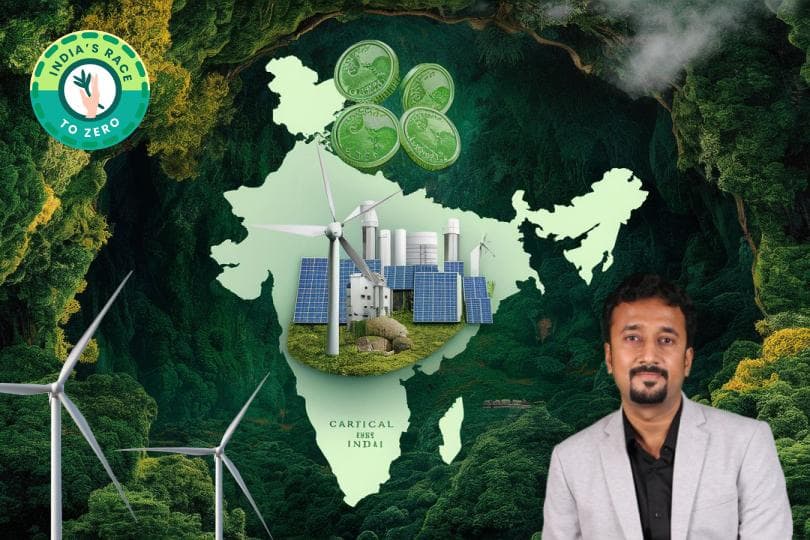A New Era For Indian Carbon Credit Market
India’s Carbon Credit Dominance: Leading climate action & future of emissions trading.
Manish Dabkara

As the global community grapples with the urgent need to combat climate change, India emerges as a beacon of hope, spearheading ambitious initiatives to address the pressing issue of carbon emissions. With a population exceeding 1.3 billion and a rapidly expanding economy, India's proactive stance towards climate action is not just commendable but also imperative for the sustainability of our planet.
Climate Action in India
India has seen a significant increase in renewable energy installations in recent years, setting ambitious goals to expand its renewable energy capabilities, with a focus on solar and wind power. Initiatives like the International Solar Alliance and the Green Energy Corridors project have established India as a major player in the renewable energy market, attracting significant investments and driving innovation.
The Indian government is committed to a sustainable future, aiming to achieve a 500 GW renewable energy target by 2030. This goal is supported by promoting renewable energy and emphasizing energy efficiency in key sectors such as industry, building, and transportation. In transportation, India is advancing by promoting electric mobility, an essential move to reduce carbon emissions. With various schemes and incentives, India supports the adoption of electric vehicles and the development of necessary charging infrastructure, significantly contributing to reducing the transportation sector's carbon footprint.
India's climate action doesn't stop at energy. Recognizing the importance of sustainable agriculture and forestry in combating climate change, initiatives like the Pradhan Mantri Krishi Sinchayee Yojana and various agroforestry programs are in place to promote climate-resilient farming and increase forest coverage while reducing deforestation. Aware of its vulnerability to the impacts of climate change, India is enhancing its resilience and adaptation measures. This includes strengthening early warning systems and investing in climate-resilient infrastructure to protect its communities and ecosystems from the adverse effects of climate change.
As India continues to lead in climate action, the outlook for the carbon credit market in the country is promising. With robust policies, ambitious targets, and a strong commitment to sustainability, India is set to maintain its position as a major generator of carbon credits, paving the way for a greener, more sustainable future.
The Indian Carbon Market
Introducing the Indian Carbon Market (ICM), India is poised to embark on a transformative journey towards decarbonising its economy through the trading of Carbon Credit Certificates. With a national framework in the pipeline, the ICM aims to align with India's emissions trajectory while fostering a dynamic marketplace for GHG emissions reduction.
Under the revamped Carbon Credit Trading Scheme, the ICM will extend its scope beyond energy savings, encompassing various potential energy sectors in India. Sector-specific GHG emissions intensity benchmarks and targets will drive trading activities, ensuring alignment with India's climate goals and facilitating a transition to cleaner technologies.
Critical to the success of the ICM will be the development of robust methodologies for estimating emissions reductions and removals from registered projects, coupled with stringent validation, registration, verification and issuance processes. The implementation of Monitoring, Reporting, Verification (MRV) guidelines will further enhance transparency and accountability within the scheme. Institutional and governance structures will be established to delineate roles and responsibilities, with capacity building initiatives aimed at empowering all stakeholders in navigating the complexities of carbon trading.
The ICM is poised to unlock new mitigation opportunities by stimulating demand for emission credits from both private and public entities. By providing a competitive marketplace for carbon trading, the ICM will drive the adoption of clean technologies and facilitate GHG emissions reductions at minimal cost, thereby accelerating India's transition towards a low-carbon economy.
The amended regulatory framework lays the groundwork for India's national emission trading system, heralding a new era for the Indian carbon credit market. By amalgamating existing energy efficiency and renewable energy trading mechanisms, the national emission trading system promises to streamline operations and unlock new market potentials.
Furthermore, the Green Credit Programme underscores India's commitment to incentivising environmental stewardship across various sectors. Aligned with the vision for 'Lifestyle for Environment (LiFE)' and net-zero carbon emissions, the programme aims to catalyse behavioural change and reward ecosystem services, thus advancing India's sustainable development goals.
Significance of Establishing a National Emissions Trading System
The creation of a national emissions trading system is crucial in today's global fight against climate change. This system allows for the trading of carbon credits, which represents reductions in greenhouse gas emissions, enabling entities to meet their emission reduction targets effectively.
A national carbon market offers numerous benefits, such as economic incentives for reducing emissions and fostering a culture of innovation by minimizing costs associated with climate objectives. Additionally, a successful carbon market can attract significant domestic and international investments in clean technologies, spurring economic growth and creating green jobs.
The Carbon Market Prospect
The carbon credits market is evolving rapidly, driven by a global push for climate action. Challenges remain, such as geopolitical instability and regulatory changes, but the future of carbon markets looks optimistic. With ongoing government and industry commitment to emission reduction and sustainability, carbon markets are expected to play a pivotal role in driving environmental stewardship and international cooperation.
Exponential Pathway Ahead
As we stand at the cusp of a new era in climate action, the future of carbon markets beckons with promise and possibility. Despite the challenges and uncertainties that lie ahead, the resolute commitment of stakeholders across the globe to sustainability and emissions reduction fuels optimism.
In envisioning this exponential pathway forward, we embrace the opportunity to catalyse transformative change, driving innovation, collaboration and environmental stewardship. Together, let us embark on this journey towards a greener, more sustainable future, where carbon markets serve as catalysts for positive impact, shaping a world where prosperity and planetary health go hand in hand.
